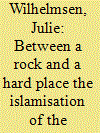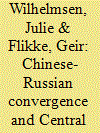| Srl | Item |
| 1 |
ID:
059422


|
|
|
| 2 |
ID:
108909


|
|
|
|
|
| Publication |
2011.
|
| Summary/Abstract |
Since the mid-1990s, China's and Russia's strategic outlooks have gradually been converging. The two great powers have incrementally shed their mutual apprehensions and started a comprehensive and multifaceted cooperation in the Shanghai Cooperation Organisation (SCO). Simultaneously, as the rift between the US and Russia has opened up and the differences in their views on regional security in Eurasia have become even more evident, China's and Russia's quests for new models for regional security in Central Asia have gained ground. Enveloping the Central Asian states on issues of collective and energy security, both states are sternly against US dominance in international affairs. In this sense, they have initiated a new geopolitical script around Central Asia. As their mutual interests hold sway over US influence regionally, questions remain on whether specific interests are compatible, or harbour new rivalries. Chinese-Russian interaction in Central Asia reveals that there might be limits to the future expansion of their partnership.
|
|
|
|
|
|
|
|
|
|
|
|
|
|
|
|
| 3 |
ID:
074228


|
|
|
|
|
| Publication |
2005.
|
| Summary/Abstract |
The article discusses the emergence of a Russian version of the Bush doctrine in the Commonwealth of Independent States (CIS) and Russian officials’ conceptual stretching of the strategic culture embodied in the National Security Concept (NSC) and the Military Doctrine (MD) from 2000 onwards. While these documents seem to cherish multilateralism and United Nations (UN) primacy in questions of global and regional security, terrorist attacks on Russia proper have engendered a more assertive approach to regional security issues in the Caucasus and Central Asia and brought Russian officials to consider unilateral pre-emptive strikes against terrorist bases. In the case of the Caucasus, Russia has been striking against terrorist bases on Georgian territory and contributed to constructing a failed state, whereas in the Central Asian case, Russia has sought to revitalise the defunct CIS security framework and pledge assistance to ‘allies’ in the fight against terrorism. The article argues that the war against terrorism has given Russia a new footing in the CIS. The issue of security is more salient, as is the reliance on military force to facilitate it.
|
|
|
|
|
|
|
|
|
|
|
|
|
|
|
|
| 4 |
ID:
190903


|
|
|
|
|
| Summary/Abstract |
Evolving official Russian identifications of Georgia amount to a dangerous securitisation of this small neighbour – achieved through a focus not on Georgia itself but on Western engagement in the region. With the long absence of face-to-face diplomatic encounters and contact, the Russian idea of Georgia as a ‘Western proxy’ has become entrenched. This article advances a social explanation of Russian foreign policy that speaks to geopolitical explanations in foregrounding great power interaction and security by drawing on insights from a discourse-theoretical reading of securitisation theory. It adds value to social explanations by showing how the identification of another political entity can be changed into that of a ‘proxy’ through its integration into a larger ‘radically different other’, and how this expansion occurs in interplay with interpretations of physical manifestations of the larger ‘radically different other’ in the ‘proxy’. Finally, it draws attention to the impact of physical encounters on foreign policy in these times of COVID-19, war, and growing isolationism in world affairs.
|
|
|
|
|
|
|
|
|
|
|
|
|
|
|
|
| 5 |
ID:
090324


|
|
|
|
|
| Publication |
2009.
|
| Summary/Abstract |
Azerbaijan is deemed to be the most secular of all post-Soviet Muslim counties. Nevertheless, growing independent Islamic activism, inspired by the international Islamic discourse and helped by foreign Islamic actors, and combined with a repressive regime response to this activity carried out under the banner of antiterrorism may contribute to make Islamism a potent factor in Azerbaijan. This article maps out independent Shi'a and Sunni activism and regime response in Azerbaijan. By assessing the dynamics between these two factors the article draws conclusions on the potential for politicization and radicalization of Islam in Azerbaijan.
|
|
|
|
|
|
|
|
|
|
|
|
|
|
|
|
| 6 |
ID:
168904


|
|
|
|
|
| Summary/Abstract |
This article investigates how Russian foreign policies are shaped in a two-level interactive social game. Russian foreign policies take their cue from ingrained identity positions articulated by the state leadership and negotiated in domestic debates, but they are also informed by interaction with other states. The article explains the shift in Russian policies away from pragmatic cooperation with the West in Syria from autumn 2015 onwards. While the Russian leadership initially sought such cooperation, the prominence of anti-Western discourse in Russia following the crisis in Ukraine as well as the West's rejection of Russia in this period spurred Russia to act independently in Syria.
|
|
|
|
|
|
|
|
|
|
|
|
|
|
|
|
| 7 |
ID:
167559


|
|
|
|
|
| Summary/Abstract |
This article investigates how Russian foreign policies are shaped in a two-level interactive social game. Russian foreign policies take their cue from ingrained identity positions articulated by the state leadership and negotiated in domestic debates, but they are also informed by interaction with other states. The article explains the shift in Russian policies away from pragmatic cooperation with the West in Syria from autumn 2015 onwards. While the Russian leadership initially sought such cooperation, the prominence of anti-Western discourse in Russia following the crisis in Ukraine as well as the West's rejection of Russia in this period spurred Russia to act independently in Syria.
|
|
|
|
|
|
|
|
|
|
|
|
|
|
|
|